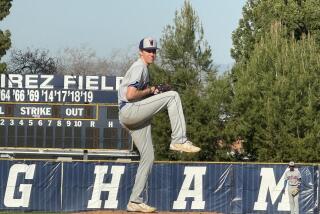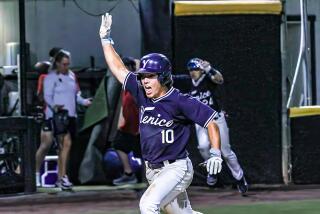Slugger Presses for His Goals : Venice First Baseman Sets His Sights on the Pros
- Share via
If Charles Atlas were alive, he would be very proud of Colin Franker, the Venice High School first baseman whose power hitting led his team to its second straight Los Angeles City 3-A championship.
Franker didn’t get sand kicked in his face by the bully of the beach, as always happened in the magazine ads for Atlas’ body-building course. The Venice senior didn’t determine to turn his puny body into a powerful physique through weightlifting and Atlas’ “dynamic tension” techniques and then return and beat up the bully.
But Franker, who had been an all-star baseball player since his first year in Little League, did have his nose rubbed in the dirt a little in 1982, when he was a 5-9, 130-pound, 15-year-old, third-string first baseman on a Culver City Babe Ruth league all-star team.
Most of that team’s starters, including Santa Monica High catcher Kelly Mann and Culver City High pitcher-shortstop David Dawson, had been on the team that won the national Babe Ruth championship the year before. And they were more widely heralded than Franker in high school--until this year.
Weights, Muscle, Power
Third stringers didn’t get much chance to play on that Babe Ruth team, and Franker badly wanted to play--so much that after the season he went on a weightlifting program and grew into a 6-0, 185-pound slugger who can bench press 275 pounds. And meanwhile, he and his bat have given outfield fences--not bullies--quite a pounding.
Not only would Charles Atlas be proud of Franker, but so would Horatio Alger for the way he went about becoming a success in baseball. “At the start of each season I set goals,” he said in an interview at the Venice High baseball field, where one of his playoff homers this year cleared not only the right field fence but also three houses across the street.
His goal in his sophomore year was to make the varsity, and he did, halfway through the season after starting out on the junior varsity.
As a junior, he said, his goals were to help Venice win a City championship and to be the first baseman on the All-City team. He did both, after he hit .440 with 5 home runs and led the Western League with 33 runs batted in. Venice defeated Westchester, 3-2, in the title game at Dodger Stadium, and Franker singled twice in four trips to the plate.
3 Major Goals
This year he had three aims: to help the Gondoliers retain their City championship, to repeat as All-City and to be selected in the June major league draft.
Venice won the title, defeating Palisades, 8-5, last week in Dodger Stadium after Franker hit .531 with 7 homers and 48 RBIs during the regular season and smacked three home runs and drove in nine runs in three playoff games.
Franker was named Western League player of the year and seems certain of being an All-City selection again, even though he had an off-day in the championship game, striking out twice and going hitless in three at-bats. Palisades junior catcher John Dolak stole Franker’s thunder, setting a City record by clubbing two homers, a first in a Dodger Stadium championship game.
Franker admitted that he was “pressing some” in the major league park: “I guess I was caught up in the media hype before the game, and I was trying to win that game single-handedly.”
He Wasn’t Drafted
He did not achieve his third goal of being selected in the major league draft, which took place the week before the title game with Palisades. “I was kind of disappointed at being passed over, but I think I will change their minds in maybe three or four years.”
Those three or four years will be spent by Franker on a baseball scholarship at the University of Hawaii. He said Hawaii coaches plan to put him on a program to improve his speed and that he thinks his lack of speed was the chief reason he was not picked in the draft.
Venice Coach Jeff Shimizu said major league scouts “are funny. You never know what they’re looking for. Colin has decent speed; he runs to first base in 4 seconds flat. He can’t do it in 3.7, like the speedsters--but you don’t have to be very fast when you hit home runs.”
Shimizu, who played second base for Coach Art Harris on the 1972 Venice team that won a City title, said Franker “does everything else well to compensate for his lack of speed. He plays good defense; he is an outstanding fielder with good hands and a good arm.
“He hits for power, which is always a major thing that scouts are looking for. If he is not as fast as some players, he makes up for that by being smart, by his experience and anticipation.”
Harris the Loser
Harris, whose Venice teams won eight consecutive Western League titles before he went over to coach the first West Los Angeles College baseball team, would have loved it if Hawaii and other college teams had never heard of Franker. He said he would have loved to have the power hitter play for him at WLAC, where Harris has often built strong teams in the last decade with top Westside prep players.
When Franker hit a home run that sailed over the 400-foot mark in center field in a playoff game a couple of weeks ago at the WLAC diamond, Harris said he was standing alongside Franker’s father, also named Colin and a UCLA microbiology professor.
“I kiddingly told his dad, ‘Nobody’s ever hit two home runs over the center field fence here. You want to let him play here and give him another shot at it?’ ”
Harris said major league scouts may not have been impressed with Franker’s running, “but they had to be impressed with how quickly he hit it out of here.”
“He probably has the most legitimate power of any of the left-handed hitters in this area that I’ve seen in quite awhile. He looks so much like a six-foot version of Mike Epstein,” a long-ball hitting first baseman who graduated from Fairfax High School and played at Cal and later on some of the Baltimore Orioles’ championship teams.
‘He’ll Be a Good One’
“Colin has that quick power that baseball people look for. He’ll be a good one. Colleges do a good job in teaching running techniques. Look what (retired UCLA track coach) Jim Bush is doing with the Los Angeles Raiders. I think it’s obvious that Colin will get a little faster, though he’s not going to be a sprinter.”
Shimizu said that when Franker “walked in . . . three years ago, I looked at him and he did have a lot of talent. But the most important thing he did was that he worked hard for three years in our program.
“We always tell the students that, if you put the time in, work hard and dedicate yourself, you’re going to get results. Colin definitely got results.”
If Franker works as hard at getting quicker as he did on his strength and physique, however, he may not get any more attention from major league scouts.
He’ll go by them before they can see him.
More to Read
Get our high school sports newsletter
Prep Rally is devoted to the SoCal high school sports experience, bringing you scores, stories and a behind-the-scenes look at what makes prep sports so popular.
You may occasionally receive promotional content from the Los Angeles Times.






